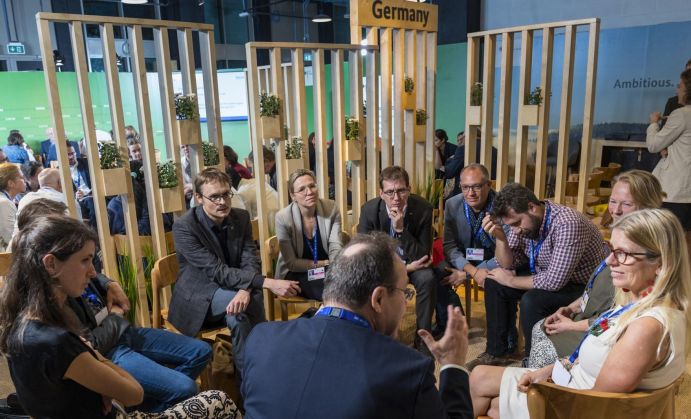COP29: The German Federal Ministry of Education and Research at the UNFCCC Climate Change Conference
The 29th UNFCCC Conference of the Parties (COP29) will take place in Baku, Azerbaijan, from 11 to 22 November 2024. The COP is the supreme decision-making body of the UNFCCC. Around 40,000 participants from the fields of politics, business, science and civil society are expected to attend the conference.

The focus of COP29 will be the approval of a new financing target for the period from 2025: in 2009, the industrialized countries agreed to provide 100 billion US dollars annually to developing countries from 2020 to help them adapt to climate change and reduce greenhouse gas emissions. In 2022, the industrialized countries reached this target for the first time. At the 2015 UN Climate Change Conference in Paris, governments decided to set a New Collective Quantified Goal (NCQG) for climate finance before 2025. This new goal is to be adopted at COP29.
Another topic will be the implementation of Article 6 of the Paris Agreement, which allows member states to work together to achieve their national climate targets. The exact terms such cooperation, for example through CO2 certificates, is the subject of negotiations.
Outside of the negotiations, particular attention will be paid to new Nationally Determined Contributions (NDCs): All member states must submit updates of their NDCs by the end of February 2025 at the latest. The first of these updates will be presented in Baku. According to the Paris Agreement, these should represent an increase in efforts and put the world on a path that keeps global warming well below 2°C, if possible below 1.5°C, compared to pre-industrial levels.
The climate negotiations will be accompanied by a climate fair where a wide range of stakeholders can exchange ideas on implementing the Paris Agreement. The German Federal Ministry of Education and Research (BMBF) as well as BMBF-funded projects and measures will be involved in various activities. The core message will be: Successful climate policy needs climate research, because research provides orientation for fact-based political decisions. Research and innovation play a key role in developing solutions to combat climate change and in finding effective approaches to adapting to the consequences that are becoming ever more apparent.
Side Events at the German Pavilion:
All side events at the German Pavilion will be streamed live on the www.german-climate-pavilion.de platform and can also be viewed afterwards. The times are given in Baku local time (GMT +4).
- 16 November 2024, 7:00–9:00 p.m.: BMBF "Science for Action Evening"
- 21 November 2024, 10:00–11:30: scientific side event "Strengthening the resilience of coastal communities: How people, nature and climate benefit from mosaic spatial planning and co-designed management of coastal ecosystems" (organised by the BMBF funding programme CDRmare and WBGU)
Side events in other pavilions:
- 11 November 2024, 4:45–6:15 p.m.: Scientific side event "Mitigation by Renewable Energy Solutions on industrial scales in Africa and Asia" (co-organised by the BMBF funding programme CLIENT-II)
- 19 November 2024, 11:30–1:00 p.m. (Side Event Room 9): "Action on the First Global Stocktake: Contributions of iGST's Civil Society in West Africa" (co-organised by the climate competence centre WASCAL, that is supported by BMBF)
- 19. November 2024, 6:30–8:00 p.m. (Side Event Room 7): "RE and CDR options with new materials in buildings, agroforestry, agricultural and forestry sectors" (Participation of the project DACCUSS-Pre from the BMBF funding programme CDRterra)



